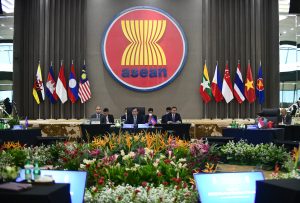By engaging Ukraine ahead of the upcoming ASEAN and East Asian summits, Cambodia’s Prime Minister Hun Sen has elevated the annual event beyond the usual round of handshakes and back slapping and put Cambodia firmly under the international spotlight.
The summits, which will be followed by the G-20 meet in Bali and the Asia-Pacific Economic Cooperation (APEC) summit in Bangkok, are expected to focus on the global economy and the worst inflation in four decades.
Regional trade, post-COVID-19 recovery, and climate change will be the bread and butter issues, alongside weightier matters of state, in particular the long-running maritime disputes in the South China Sea and the question of what to do with military-ruled Myanmar.
That’s a full plate, but Hun Sen has a healthy appetite for global diplomacy.
He likes the international stage and as the region’s longest serving non-monarchical leader, this will be his third and certainly last ASEAN summit as the rotating chair of the 10-nation bloc. All ASEAN leaders, aside from the head of Myanmar’s military junta, will attend.
United Nations Secretary-General António Guterres and United States President Joe Biden have confirmed participation alongside other ASEAN dialogue partners and those with observer status, and the government here has said it hoped each of the 25 invited leaders will make the trip.
To date, the notable absence is Russian President Vladimir Putin who, as the Cambodian government persistently notes, “is yet to confirm” his attendance. And that’s unlikely given Hun Sen’s support for Ukraine and last Tuesday’s online meeting with his counterpart Volodymyr Zelenskyy.
The pair agreed that Hun Sen will visit Ukraine at “an appropriate time,” send a team of de-miners to the war-torn country, and exchange ambassadors.
Zelenskyy also asked to deliver a statement via video link during the summit and reaffirmed Ukraine’s wish to become a Sectoral Dialogue Partner, which would be one step away from full Dialogue Partner status, on par with the likes of the U.S., Australia, Japan, and Russia.
Hun Sen supported the request for a diplomatic upgrade and offered to mediate peace talks between Moscow and Kyiv on the sidelines of the summits. This is not unrealistic given that the Ukrainian Foreign Minister Dmytro Kuleba will also attend the summit for the signing of the Instrument of Accession to the Treaty on Amity and Cooperation in Southeast Asia.
Hun Sen also “expressed concern over the recent attacks on [Kyiv] and other cities in Ukraine, which have claimed many deaths, injuries and severe damage to civilian infrastructure, power outages and water shortages, as well as serious energy and food crises,” a statement said.
While Russia is also an old Cold War ally of Cambodia, there has been scuttlebutt in diplomatic circles for almost two decades regarding Hun Sen’s annoyance with Putin over his unwillingness to write off Cambodia’s debts of $1.5 billion, incurred after the fall of the Khmer Rouge in 1979. That debt put an unnecessary strain on relations between Moscow and Phnom Penh until it was eventually re-categorized as an “investment,” an ambiguous term that failed to impress.
This is not a seismic diplomatic shift, but it does matter.
In opposing Russia’s invasion of Ukraine, Cambodia was also a co-sponsor of last month’s U.N. resolution that condemned Moscow’s annexation of four Ukrainian regions.
Additionally, Russia is almost alone in its absolute support for the junta in Myanmar – a policy which Hun Sen, at the start of his time as this year’s chair, seemed comfortable with as he began negotiations to normalize relations between Naypyidaw and ASEAN.
Those talks ultimately failed, served up as an embarrassment after the junta did not release the Australian economist Sean Turnell, as reportedly promised, and then ignored Hun Sen’s pleas not to execute four pro-democracy activists in July, on the eve of the ASEAN Foreign Ministers’ Meeting.
Ukraine is one item on Cambodia’s foreign policy agenda that syncs neatly with the West and that should annoy Moscow. A much harsher stance on Myanmar is expected once Indonesia assumes the chair for 2023, when Cambodia is expected to acquiesce. That should also annoy Putin.
Moscow’s reality is that its influence in Southeast Asia is now minimal and too often overrated by Putin’s delusions of Russia as a great superpower.
As such, his failure to attend the upcoming ASEAN summit – as viewed through the Cambodian prism – is just another example of Russia’s lost relevance, more so as the political dynamics across Southeast Asia are rapidly being reshaped.
































